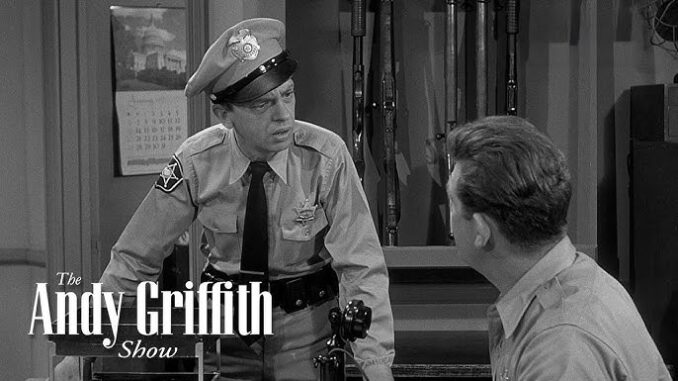
The morning sun in Mayberry always seemed to filter through the leaves a little softer, kiss the porch swings a little warmer. It painted the picket fences with a golden glow and made the freshly swept sidewalks gleam. Birds sang not just songs, but lullabies, and the scent of Aunt Bee’s morning biscuits mingled with the faint aroma of gasoline from Goober’s garage, creating a symphony unique to this North Carolina haven. Life flowed like the gentle current of Myers Lake – predictable, peaceful, and profoundly comforting.
But on one particular Tuesday, the familiar rhythm of Mayberry was abruptly shattered, not by the clang of a runaway wagon or a minor fender bender, but by a crisp, official-looking letter that arrived at the Sheriff’s office. It bore the seal of "SynergyCorp Development," a name as alien and unfeeling as the steel and glass monoliths it proposed to erect. The letter wasn’t addressed to Sheriff Andy Taylor, but to the entire town, a formal declaration of intent: SynergyCorp planned to build a massive, state-of-the-art “Regional Distribution Hub” on the sprawling, picturesque farmland just beyond Opie’s favorite fishing hole. This wasn't just a threat to the landscape; it was a direct assault on the very soul of Mayberry.
The news spread through town faster than a freshly caught rumor from Floyd’s Barbershop. Floyd, usually the purveyor of trivial gossip, wore a look of genuine alarm as he clipped Mayor Stoner’s hair. Aunt Bee, usually unflappable, burned her biscuits for the first time in memory, her brow furrowed with concern. Even Barney Fife, whose panic button was usually hair-triggered, seemed to transcend his usual jitters, settling into a deep, trembling dread. "Andy," he sputtered, adjusting his uniform, "this ain't just a new store! This is… progress! The kind that chews up small towns and spits out subdivisions and fast-food joints!"
Andy, ever the calm center, read the proposal again, his kind eyes scanning the jargon-filled pages. "They want to build a four-lane highway right through Miller’s Meadow, Barney. And they're talking about eminent domain." He knew what this meant. Trucks rumbling through tranquil nights, blinding lights where stars once shone, and the quiet, friendly faces replaced by anonymous commuters. Mayberry, as they knew it, would cease to exist.
The first town meeting called to discuss the threat was unlike any other. There was no bickering over parking meters or squabbling about the annual picnic; only a unified, palpable anxiety. Clara Edwards, usually keen to point out every grammatical error, sat silent, her knitting needles idle. Gomer Pyle, his usual "Golleeee!" replaced by a soft lament, worried about the fate of the "precious little critters" in the meadow. Goober, equally distressed, fretted about whether his garage would even be needed if everyone just drove on a giant highway past town.
A representative from SynergyCorp, a sharp-suited man named Mr. Thorne, arrived a few days later, radiating an aura of polished impatience. He spoke in terms of "efficiency," "economic growth," and "job creation," words that sounded like a foreign language in Mayberry. He presented slick blueprints and financial projections, portraying the hub as an inevitable tide of modernity that Mayberry should simply embrace. He saw Mayberry as an obstacle, a quaint anomaly ripe for development.
But Mayberry had a different kind of strength. It wasn't in balance sheets or corporate strategies; it was in its collective memory, its shared values, and its quiet, unyielding stubbornness. Andy didn't try to out-argue Mr. Thorne on economics. Instead, he invited him to supper at Aunt Bee’s, where the aroma of fried chicken and the gentle hum of conversation slowly began to chip away at the corporate veneer. He took him fishing with Opie, explaining the quiet joy of a sun-dappled afternoon and the simple satisfaction of a catfish on the line. Barney, in his own way, tried to explain Mayberry’s unique set of bylaws, which seemed to confound Mr. Thorne more than any legal brief.
The town, for its part, didn't resort to angry protests or shouted slogans. Instead, they showed up at the courthouse en masse, not with picket signs, but with humble testimonies. Floyd spoke of the healing power of a good haircut and friendly chatter. Aunt Bee tearfully described her annual geranium planting in Miller’s Meadow, a tradition passed down generations. Opie, wide-eyed, simply showed a drawing he’d made of the meadow, dotted with butterflies and his secret treehouse.
Mr. Thorne, initially dismissive, found himself strangely disarmed. He was used to adversaries, not neighbors sharing pie. He was used to arguments, not heartfelt stories about simple pleasures. He started to notice the way the light fell just right on the old courthouse, the genuine smile from a stranger, the absolute purity of the air. The "efficiency" of a concrete hub began to feel hollow against the richness of human connection.
The resolution didn’t come from a dramatic legal battle, but from a quiet shift in perspective. Mr. Thorne, confounded by Mayberry’s gentle resistance, and perhaps a little moved by its understated charm, returned to SynergyCorp with a different report. He spoke less of untapped potential and more of intangible value. The company, facing an unexpected and deeply personal form of opposition, reconsidered. They scaled back their plans, relocating the hub miles away to less contested ground, choosing to bypass Mayberry entirely rather than flatten its spirit.
Mayberry had faced its biggest threat, not with force, but with its very essence. The town remained, its picket fences still gleamed, Aunt Bee's biscuits still perfumed the air, and the sun still kissed the porch swings with a uniquely Mayberry glow. The incident left a faint scar, a reminder of the fragility of their peace, but also of the indomitable strength found in community, in shared values, and in the enduring power of a simple, well-lived life. Mayberry had proven that some things, truly, are priceless.